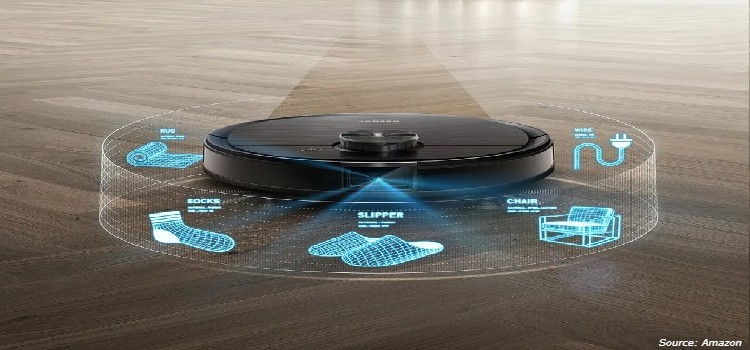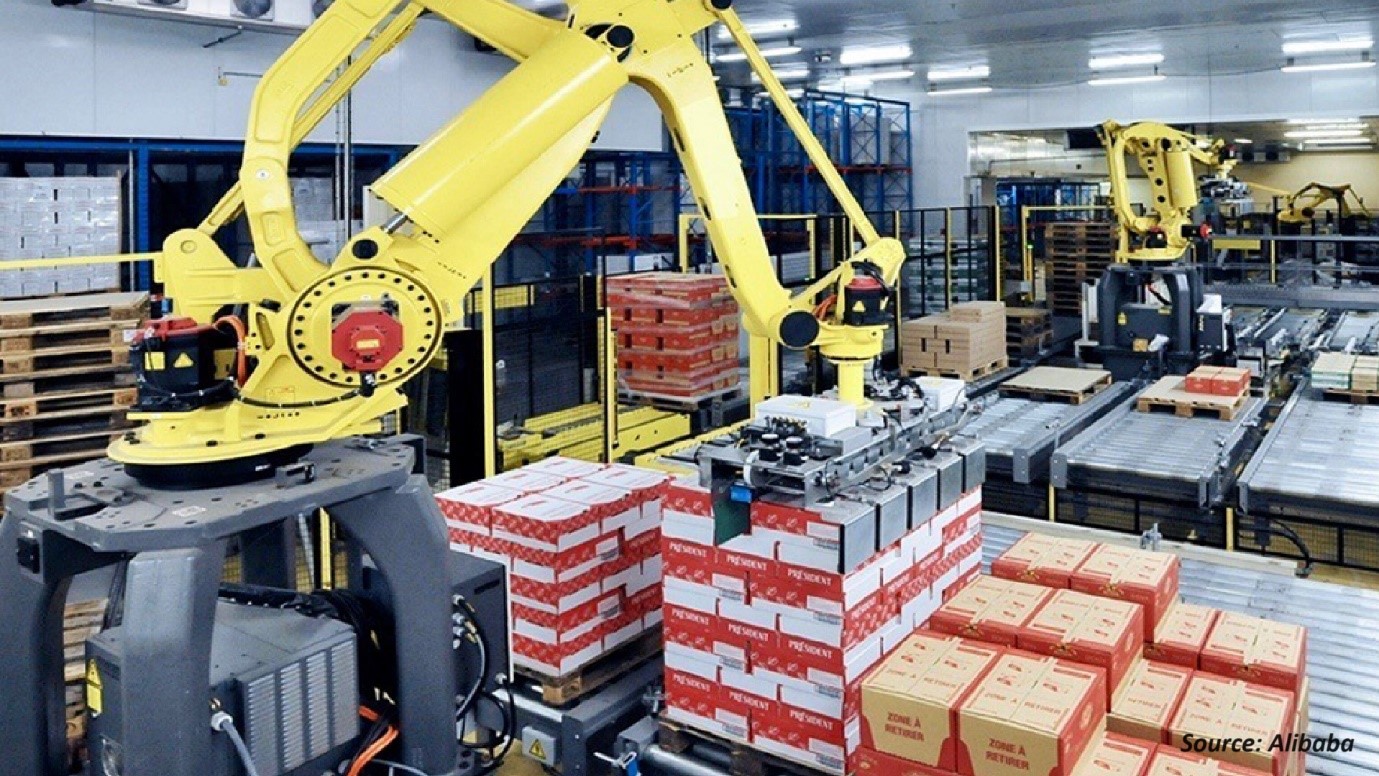
Germany Delta Robots Market by Axis Type (Double Axis, Three Axis, Four Axis, Five Axis, and Six Axis), by Payload Capacity (Up to 3 Kilogram, 3.1 to 8 Kilogram, 8.1 to 15 Kilogram, and More than 15 Kilogram), by Version Environment (Standard and Hygiene), by Application (Assembly, Pick & Place, Material Handling, Palletizing/Packaging, and Others), by Industry Vertical (Electronics, Cosmetics, Food & Beverages, Pharmaceuticals, and Others) – Opportunity Analysis and Industry Forecast, 2023–2030
Industry: ICT & Media | Publish Date: 10-Oct-2023 | No of Pages: 75 | No. of Tables: 59 | No. of Figures: 28 | Format: PDF | Report Code : N/A
Market Overview
Germany Delta Robots Market was valued at USD 148.86 million in 2022, and is predicted to reach USD 270.23 million by 2030, with a CAGR of 6.78% from 2023 to 2030. Delta or parallel robots are highly specialized robotic systems characterized by their unique mechanical structure and exceptional precision. These robots have three or more arms connected to a common base, forming a parallel mechanism that gives exceptional precision and structural stability.
Delta robots are renowned for their remarkable speed, agility, and accuracy, making them ideal for a wide range of high-speed, precision applications in manufacturing, electronics, food & beverage, pharmaceuticals, and others.The design of delta robots allows them to move with incredible precision in all three dimensions, such as assembly lines, pick-and-place operations, and intricate manufacturing processes. Making them particularly well-suited for tasks involving pick and place, assembly, packaging, and material handling.
Their parallel kinematic structure, a robotic system design where multiple limbs work parallel to control end-effector motion, enabling precise coordination and control, provides superior rigidity and stability, ensuring consistent and reliable performance. Depending on their specific configuration, they can handle various payloads, ranging from lightweight items to heavier components.
Thus, delta robots are a class of robotic systems renowned for their speed, precision, and versatility. Their unique parallel structure, including rigidity, speed, and stability, makes them a preferred choice for various high-speed automation tasks across multiple industries, contributing to increased efficiency and precision in modern manufacturing and assembly processes.
Market Growth Boosted by Expansion of a Leading Delta Robot Provider
The presence of a big giant company that offers many products related to delta robots and performing business expansion is boosting the market growth. For instance, in November 2022, KUKA AG introduced the KR 3 D1200, a robot that excels in various applications, including the precise handling of food items, with a maximum payload capacity of 6 kg. Regarding foodstuffs and pharmaceuticals, the KR 3 D1200 offers advantages, as it comes equipped with food-safe H1 lubricants as a standard feature, making it suitable for secondary applications involving food handling.
Also, in August 2023, IGUS partnered with the MassRobotics Associated Network to expand robotic automation services for small and midsize enterprises (SMEs) and advance robotics technology. Under this partnership, IGUS will provide affordable, cutting-edge automation solutions to SMEs worldwide.
Delta Robots Mitigate Labor Shortages and Ensure Consistent Production in Germany
Germany, similar to many other countries, faces challenges related to shortages of skilled labor, especially in certain industries. This scarcity of skilled workforce can impede manufacturing processes and jeopardize consistency in production. Delta robots provide an attractive solution by reducing the dependence on manual labor.
These highly automated machines excel in performing precise, repetitive tasks swiftly and accurately, thereby mitigating the impact of labor shortages. By seamlessly integrating into production lines, delta robots not only maintain consistent output but also enhance efficiency, ensuring that industries in Germany can meet their production demands while navigating labor challenges. Thus, this is expected to drive the growth of the market within the country.
Competitive Challenges in Germany's Delta Robot Market Amidst Pharmaceutical Industry and Global Competition
The substantial presence of numerous pharmaceutical companies and a dominant industry leader in the region raises concerns about intense competition. Germany's delta robot market may face challenges in gaining a competitive edge, mainly when competing with countries including the US, which also boasts many pharmaceutical companies. This heightened competition could hinder the market entry and growth prospects in Germany.
Integration of Advanced Technologies to Enhance Precision represents a significant opportunity for the Market
Integrating advanced technologies, such as computer vision and artificial intelligence (AI), to enhance precision represents a significant opportunity for the delta robot market. These cutting-edge technologies enable delta robots to operate more accurately and efficiently, opening up new avenues for applications across various industries.
The integration of computer vision and AI not only enhances precision but also improves overall productivity and reduces errors in manufacturing processes. This can result in cost savings, higher product quality, and increased competitiveness for businesses that leverage delta robots with these advanced technologies. As industries continue to embrace automation and demand higher precision and flexibility, the delta robot market is poised to benefit significantly from the opportunities created by integrating computer vision and AI.
Competitive Landscape
The Germany Delta Robots industry includes several market players such as ABB Ltd., Fanuc Corporation, Kawasaki Heavy Industries Ltd, Yaskawa Electric Corporation, FESTO, Weiss GmbH, Omron Corporation, IGUS GmbH, Cama Group, and KUKA AG.
Key Benefits
-
The Germany Delta Robots market report provides a quantitative analysis of the current market and estimations through 2023-2030 that assists in identifying the prevailing market opportunities to capitalize on.
-
The study comprises a deep dive analysis of the market trend including the current and future trends for depicting the prevalent investment pockets in the market.
-
The information related to key drivers, restraints, and opportunities and their impact on the market is provided in the report.
-
The competitive analysis of the market players along with their market share in the Germany Delta Robots market.
-
The SWOT analysis and Porter’s Five Forces model are elaborated in the study.
-
Value chain analysis in the market study provides a clear picture of the stakeholders’ roles.
Germany Delta Robots Market Key Segments
By Axis Type
-
Double Axis
-
Three Axis
-
Four Axis
-
Five Axis
-
Six Axis
By Payload Capacity
-
Upto 3 Kilogram
-
3.1 to 8 Kilogram
-
8.1 to 15 Kilogram
-
More than 15 Kilogram
By Version Environment
-
Standard
-
Hygiene
By Application
-
Assembly
-
Pick & Place
-
Material handling
-
Palletizing/ Packaging
-
Primary
-
Secondary
-
-
Others
By Industry Vertical
-
Electronics
-
Cosmetics
-
Food & Beverages
-
Pharmaceuticals
-
Others
REPORT SCOPE AND SEGMENTATION:
|
Parameters |
Details |
|
Market Size in 2022 |
USD 148.86 Million |
|
Market Volume in 2022 |
4546 Units |
|
Revenue Forecast in 2030 |
USD 270.23 Million |
|
Growth Rate |
CAGR of 6.78% from 2023 to 2030 |
|
Analysis Period |
2022–2030 |
|
Base Year Considered |
2022 |
|
Forecast Period |
2023–2030 |
|
Market Size Estimation |
Million (USD) |
|
Growth Factors |
The existence of major market players. Growing labor shortage concerns. |
|
Companies Profiled |
10 |
|
Market Share |
Available for 10 companies |
|
Customization Scope |
Free customization (equivalent up to 80 working hours of analysts) after purchase. Addition or alteration to country, regional, and segment scope. |
|
Pricing and Purchase Options |
Avail customized purchase options to meet your exact research needs. |
Key Players
-
ABB Ltd.
-
Fanuc Corporation
-
Kawasaki Heavy Industries Ltd.
-
Yaskawa Electric Corporation
-
FESTO
-
Weiss GmbH
-
Omron Corporation
-
IGUS GmbH
-
Cama Group
-
KUKA AG




 Speak to Our Analyst
Speak to Our Analyst


































